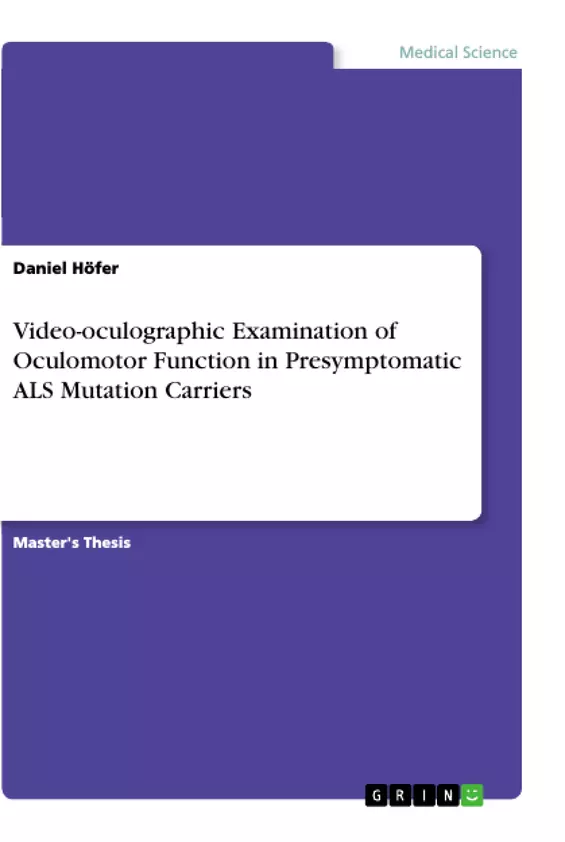This thesis deals with the video-oculographic examination of oculomotor function in presymptomatic ALS mutation carriers. Cognitive deficits are observable in ALS. This study was performed in order to test if this deficit could already be observed in a preclinical phase. Up to this moment putative alterations in a preclinical, presymptomatic phase of ALS-MC are barely studied.
Therefore, this study aimed at investigating preclinical oculomotor performance in asymptomatic ALS mutation carriers.quantitatively detect changes in executive eye movement control in asymptomatic ALS mutation carriers by video-oculographic examination under controlled conditions with healthy age, sex and educational matched healthy unrelated controls.
Amyotrophic lateral sclerosis (ALS) is the most frequent adult-onset motor neuron disease. As for now, causal therapeutic options are still limited for ALS. The devastating disease is defined as a fast progressive, multisystem degenerative disorder, which is clinically characterized by a predominant loss of motor neurons that disrupts signals to all voluntary innervated muscles. This leads to a progressive weakness of the respective muscles following an almost complete paresis after a couple of years. ALS usually ends in death due to respiratory failure after 30 months on average from disease onset.
Inhaltsverzeichnis (Table of Contents)
- 1. INTRODUCTION.
- 1.1 GENERAL DESCRIPTION OF AMYOTROPHIC LATERAL SCLEROSIS.
- 1.2 MOTIVATION OF THE PRESENT STUDY
- 1.3 CURRENT STATE OF RESEARCH IN ALS/FTD
- 1.4 EXECUTIVE CONTROL AND OCULOMOTOR CORRELATE
- 1.5 PATHOMECHANISMS IN THE ALS-FTD SPECTRUM.
- 1.6 ABNORMALITIES OF EYE MOVEMENT CONTROL IN ALS.
- 1.7 VIDEO-OCULOGRAPHY.
- 1.8 MOTIVATION AND HYPOTHESES
- 2. METHODS..
- 2.1 PARTICIPANTS AND EMOGRAPHIC HARACTERIZATION
- 2.2 EXPERIMENTAL DESIGN
- 2.3 STATISTICAL NALYSIS
- RESULTS
- 3.1 ALTERED OCULOMOTOR PERFORMANCE IN ASYMPTOMATIC ALS MUTATION CARRIERS.
- 3.2 ALTERED OCULOMOTOR PERFORMANCE IN SYMPTOMATIC ALS MUTATION CARRIERS
- 3.3 DIFFERENCES BETWEEN C9ORF72MC AND NON-C9ORF72ALS-MC
- 3.4 OCULOMOTOR PERFORMANCE DIFFERENCES BETWEEN ‘CLASSICAL' ALS AND ALS/FTD.
- 4. DISCUSSION.
- 4.1 PRESYMPTOMATIC ALS..
- 4.2 EXECUTIVE DYSFUNCTIONS IN ALS.
- 4.3 INFLUENCE OF GENETIC VARIANT.
- 4.4 DIFFERENCES BETWEEN ALS AND ALS/FTD
- 4.5 ALS STAGING MODELS..
- 4.6 VIDEO-OCULOGRAPHY.
- 4.7 LIMITATIONS AND TRENGTHS.
- 4.8 PROSPECTS OF THE STUDY
- 5. SUMMARY.
- REFERENCES AND BIBLIOGRAPHY
- LIST OF TABLES
- ACKNOWLEDGEMENTS.
Zielsetzung und Themenschwerpunkte (Objectives and Key Themes)
This Master's Thesis investigates the role of oculomotor function in presymptomatic ALS mutation carriers. The study aims to explore potential early signs of the disease and to identify potential biomarkers for diagnosis.
- Oculomotor function in presymptomatic ALS mutation carriers
- Early signs of ALS
- Potential biomarkers for ALS diagnosis
- Differences between ALS and ALS/FTD
- Influence of genetic variants on oculomotor function
Zusammenfassung der Kapitel (Chapter Summaries)
- Chapter 1: Introduction: This chapter provides a general overview of ALS, the motivation for the study, and the current state of research in ALS/FTD. It also discusses the role of executive control and oculomotor function in ALS, and the different pathomechanisms associated with the ALS-FTD spectrum.
- Chapter 2: Methods: This chapter details the methods used in the study, including participant characteristics, experimental design, and statistical analysis techniques.
- Chapter 3: Results: This chapter presents the findings of the study, focusing on altered oculomotor performance in both asymptomatic and symptomatic ALS mutation carriers. It also explores differences in oculomotor function between carriers of different genetic variants and between individuals with classical ALS and ALS/FTD.
- Chapter 4: Discussion: This chapter provides a comprehensive analysis of the results and their implications, discussing the findings in the context of presymptomatic ALS, executive dysfunctions, genetic influences, and the differences between ALS and ALS/FTD. It also explores potential future directions for research in this area.
Schlüsselwörter (Keywords)
This Master's Thesis focuses on the following keywords and topics: amyotrophic lateral sclerosis (ALS), frontotemporal dementia (FTD), presymptomatic ALS, oculomotor function, video-oculography, executive control, genetic variants, biomarkers, and disease staging models. The research employs a multidisciplinary approach, integrating clinical, neurophysiological, and genetic aspects of ALS.
Frequently Asked Questions
Can ALS be detected before physical symptoms appear?
Research suggests that video-oculographic examination of eye movements can detect preclinical executive deficits in asymptomatic mutation carriers.
What is the role of video-oculography in ALS research?
It provides a quantitative way to measure executive eye movement control, which can serve as a biomarker for cognitive and multisystem degeneration in ALS.
How does the C9orf72 mutation affect oculomotor performance?
The study investigates differences between C9orf72 mutation carriers and non-carriers to see how specific genetic variants influence the progression of oculomotor dysfunction.
What is the link between ALS and Frontotemporal Dementia (FTD)?
ALS and FTD are part of a disease spectrum; cognitive and oculomotor deficits often overlap, indicating shared pathomechanisms in multisystem degeneration.
What is the average survival time after ALS onset?
On average, ALS leads to respiratory failure and death within approximately 30 months from the onset of symptoms.
- Arbeit zitieren
- Daniel Höfer (Autor:in), 2018, Video-oculographic Examination of Oculomotor Function in Presymptomatic ALS Mutation Carriers, München, GRIN Verlag, https://www.grin.com/document/924867



